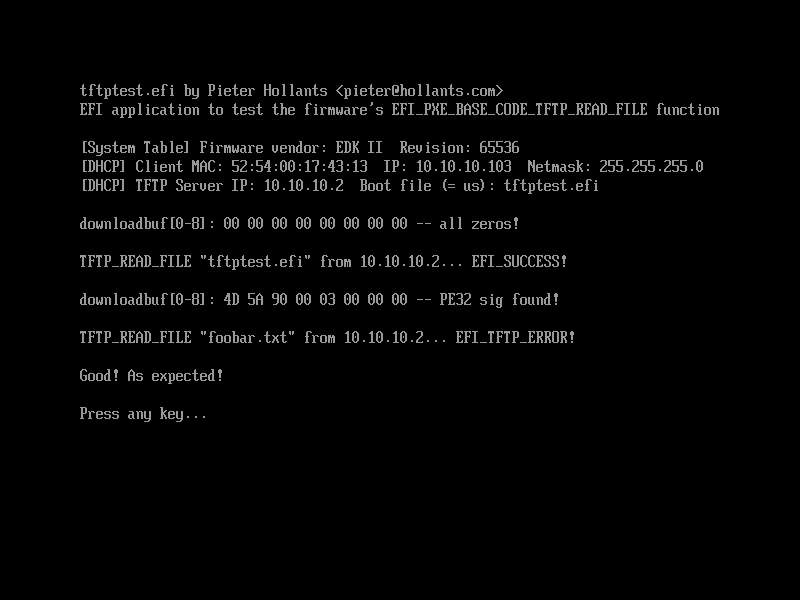Copyright (c) 2020 Pieter Hollants pieter@hollants.com
Licensed under the GNU Public License (GPL) version 3
tftptest.efi is a minimal EFI application designed to test an x86_64 UEFI
firmware's EFI_PXE_BASE_CODE_TFTP_READ_FILE function. I wrote it as a testcase
because I stumbled over a firmware bug while testing PXE booting in UEFI mode.
You will probably know PXE booting with legacy BIOSes: here a network adapter has an option ROM (physically present on a plugged-in card or part of the mainboard's BIOS in case of onboard adapters) which, if enabled, contains a minimal IPv4 stack and implementations of DHCP and TFTP in addition to the NIC-specific driver.
With UEFI, the IPv4 implementation is instead generic and part of a mainboard's firmware and also includes an HTTP client implementation so clients can boot a boot loader directly off an HTTP server. TFTP booting is however still officially supported and often the easier option if you need to support both legacy BIOS and UEFI booting. Note that because the mainboard firmware already contains all generic parts, the network adapter's option ROM now only contains an UEFI-compatible driver.
It turns out, however, that TFTP operations have not been tested in all
UEFI firmwares extensively. tftptest.efi's only purpose is to test a
particular UEFI firmware for a bug in a particular function that is
commonly used to download a file from the TFTP server,
EFI_PXE_BASE_CODE_TFTP_READ_FILE.
- Set up a PXE server for testing purposes. This involves:
- setting up a TFTP server such as in.tftpd or atftpd. Copy
tftptest.efito its TFTP root directory, e.g./var/lib/tftprootor/srv/tftproot. - setting up a DHCP server such as ISC dhcpd or dnsmasq. Configure it to tell clients to boot tftptest.efi off the TFTP server.
- setting up a TFTP server such as in.tftpd or atftpd. Copy
- Configure the client to be tested to boot in UEFI mode (NOT legacy BIOS mode!)
- Initiate PXE booting on the client, e.g. from the one-time boot menu.
- The client's UEFI firmware will initialize the network adapter and send a DHCP request.
- Your DHCP server will offer it IP configuration parameters and also
tell it to TFTP-boot
tftptest.efifrom your TFTP server. - The client's UEFI firmware will configure the network adapter with the supplied parameters.
- Next it sends a TFTP GET request to your TFTP server for
tftptest.efi. - tftptest.efi is downloaded and started.
What then happens is:
- tftptest.efi will use UEFI firmware calls to determine the network device it was booted from and obtain its IP/DHCP/PXE configuration
- It will prepare a buffer for TFTP download tests. This buffes is initialized with zeros.
- It will then call the UEFI firmware's
EFI_PXE_BASE_CODE_TFTP_READ_FILEfunction to download itself, i.e.tftptest.efi, into the prepared buffer. This simply because we KNOW that by the fact of our code being currently executed thattftptest.efidoes exist on the TFTP server. - The UEFI firmware downloads
tftptest.efiinto the download buffer. - tftptest.efi displays the first 8 bytes of the buffer and does a quick check on the first two bytes to ensure that a PE32 signature is found. All EFI executables such as Grub2, ELILO, iPXE, the Windows boot loader etc. are PE32 executables whose first two bytes are always 0x5A 0x4D.
- tftptest.efi will then do another
EFI_PXE_BASE_CODE_TFTP_READ_FILErequest but this time for a filefoobar.txtthat is supposed to not exist on the TFTP server. - The UEFI firmware tries to download
foobar.txt. - The TFTP server tells it "Nope, sorry, this file doesn't exist!"
And this is where the interesting stuff happens:
-
A proper UEFI firmware would then return a TFTP error to tftptest.efi.
You can see this behavior here:
 .
.Because tftptest.efi knows this second TFTP GET request failed, it knows it can't trust the contents of the download buffer.
-
The buggy UEFI firmware I encountered however returns "Success!" although the file didn't exist!
tftptest.efi will show the contents of the download buffer once again and you will see that they still contain the first eight bytes of tftptest.efi... which is really bad, because a proper bootloader such as ELILO will now assume that the TFTP GET request was successful and the buffer contains valid data. Boom!
For your convenience I included a readily compiled version of tftptest.efi.
If you don't trust it you can recompile tftptest.efi yourself: a Makefile
is included. You will need to have gcc and gnu-efi development files
installed and might have to change the include paths in the Makefile.
This software is licensed under the GNU Public License (GPL), version
3.0. See http://www.gnu.org/licenses/gpl-3.0.txt or the included file
LICENSE.